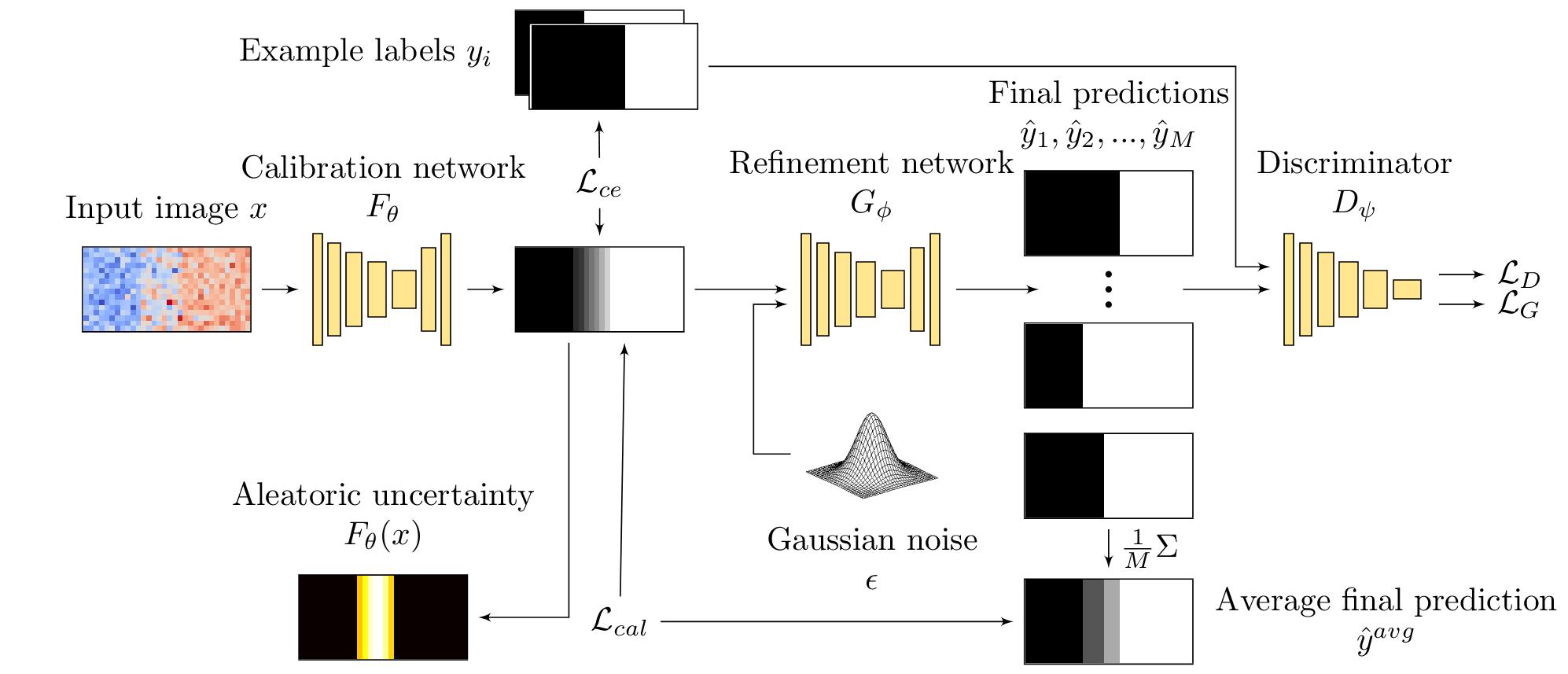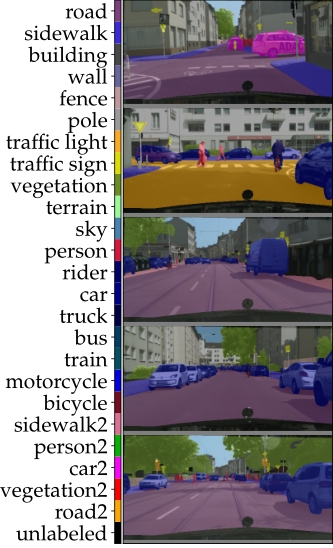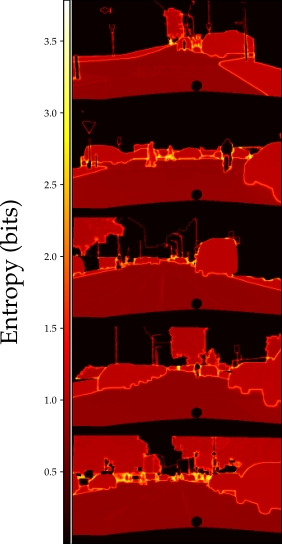Official PyTorch implementation of the Calibrated Adversarial Refinement models described in the paper Calibrated Adversarial Refinement for Stochastic Semantic Segmentation accepted at ICCV2021. An overview of the model architecture is depicted below. We show ambiguous boundary segmentation as a use case, where blue and red pixels in the input image are separable by different vertical boundaries, resulting in multiple valid labels.
Results on the stochastic version of the Cityscapes dataset are shown below. The leftmost column illustrates input images overlaid with ground truth labels, the middle section shows 8 randomly sampled predictions from the refinement network, and the final column shows aleatoric uncertainty maps extracted from the calibration network.
The code reproducing the illustrative toy regression example presented in Section 5.1. of the paper can be found in this repository.
- Python3
- NVIDIA GPU + CUDA CuDNN
This was tested an Ubuntu 18.04 system, on a single 16GB Tesla V100 GPU, but might work on other operating systems as well.
To install the requirements for this code run:
python3 -m venv ~/carsss_venv
source ~/carsss_venv/bin/activate
pip install -r requirements.txt
.
├── data
│ └── datasets
│ ├── lidc
│ └── cityscapes
│
├── models
│ ├── discriminators
│ ├── general
│ ├── generators
│ │ └── calibration_nets
│ └── losses
│
├── results
│ └── output
│
├── testing
│
├── training
│
└── utils
For the 1D regression dataset experiments, please refer to this repository. Information on how to obtain the stochastic semantic segmentation datasets can be found below.
The pre-processed 180x180 2D crops for the Lung Image Database Consortium (LIDC) image collection dataset (LIDC-IDRI) , as described in A Hierarchical Probabilistic U-Net for Modeling Multi-Scale Ambiguities (2019) and used in this work is made publicly available from Khol et. al, and can be downloaded from (here).
After downloading the dataset, extract each file under ./data/datasets/lidc/. This should give three folders under the said directory named: lidc_crops_test, lidc_crops_train, and lidc_crops_test.
Please note that the official repository of the Hierarchical Probabilistic U-Net , the version of the dataset linked above containts 8843 images for training, 1993 for validation and 1980 for testing rather than 8882, 1996 and 1992 images as used in our experiments, however, the score remains the same.
As described in our paper, we integrate our model on top of a black-box segmentation network. We used a pre-trained DeepLabV3+(Xception65+ASPP) model publicly available here . We found that this model obtains a mIoU score of 0.79 on the official test-set of the Cityscapes dataset (Cityscapes).
To get the official 19-class Cityscapes dataset:
- Visit the Cityscapes website and create an account
- Download the images and annotations
- Extract the files and move the folders gtFine and leftImg8bit in a new directory for the raw data i.e.
./data/datasets/cityscapes/raw_data. - Create the 19-class labels by following this issue.
- Configure your data directories in
./data/datasets/cityscapes/preprocessing_config.py. - Run
./data/datasets/cityscapes/preprocessing.pyto pre-process the data in downscaled numpy arrays and save under./data/datasets/cityscapes/processed.
Subsequently download the black-box predictions under ./data/datasets/cityscapes/, and extract by running tar -zxvf cityscapes_bb_preds.tar.gz
Finally, move the black-box predictions in the processed cityscapes folder and setup the test set run ./data/datasets/cityscapes/move_bb_preds.py
To train you own model on the LIDC dataset, set LABELS_CHANNELS=2 in line 29 of ./utils/constants.py run:
python main.py --mode train --debug '' --calibration_net SegNetCalNet --z_dim 8 --batch-size 32 --dataset LIDC --class_flip ''
To train you own model using the black-box predictions on the modified Cityscapes dataset, set LABELS_CHANNELS=25 in line 29 of ./utils/constants.py and run:
python main.py --mode train --debug '' --calibration_net ToyCalNet --z_dim 32 --batch-size 16 --dataset CITYSCAPES19 --class_flip True
Launching a run in train mode will create a new directory with the date and time of the start of your run under ./results/output/, where plots documenting the progress of the training and are saved and models are checkpointed. For example, a run launched on 12:00:00 on 1/1/2020 will create a new folder
./results/output/2020-01-01_12:00:00/ . To prevent the creation of this directory, set --debug False in the run command above.
A pre-trained model on LIDC can be downloaded from
here.
To evaluate this model set LABELS_CHANNELS=2, move the downloaded pickle file under ./results/output/LIDC/saved_models/ and run:
python main.py --mode test --test_model_date LIDC --test_model_suffix LIDC_CAR_Model --calibration_net SegNetCalNet --z_dim 8 --dataset LIDC --class_flip ''
A pre-trained model on the modified Cityscapes dataset can be downloaded from
here.
To evaluate this model set LABELS_CHANNELS=25 and IMSIZE = (256, 512) in ./utils/constants.py, move the downloaded pickle file under ./results/output/CS/saved_models/ and run:
python main.py --mode test --test_model_date CS --test_model_suffix CS_CAR_Model --calibration_net ToyCalNet --z_dim 32 --dataset CITYSCAPES19 --class_flip True
If you use this code for your research, please cite our paper Calibrated Adversarial Refinement for Stochastic Semantic Segmentation:
@InProceedings{Kassapis_2021_ICCV,
author = {Kassapis, Elias and Dikov, Georgi and Gupta, Deepak K. and Nugteren, Cedric},
title = {Calibrated Adversarial Refinement for Stochastic Semantic Segmentation},
booktitle = {Proceedings of the IEEE/CVF International Conference on Computer Vision (ICCV)},
month = {October},
year = {2021},
pages = {7057-7067}
}
The code in this repository is published under the Apache License Version 2.0.






